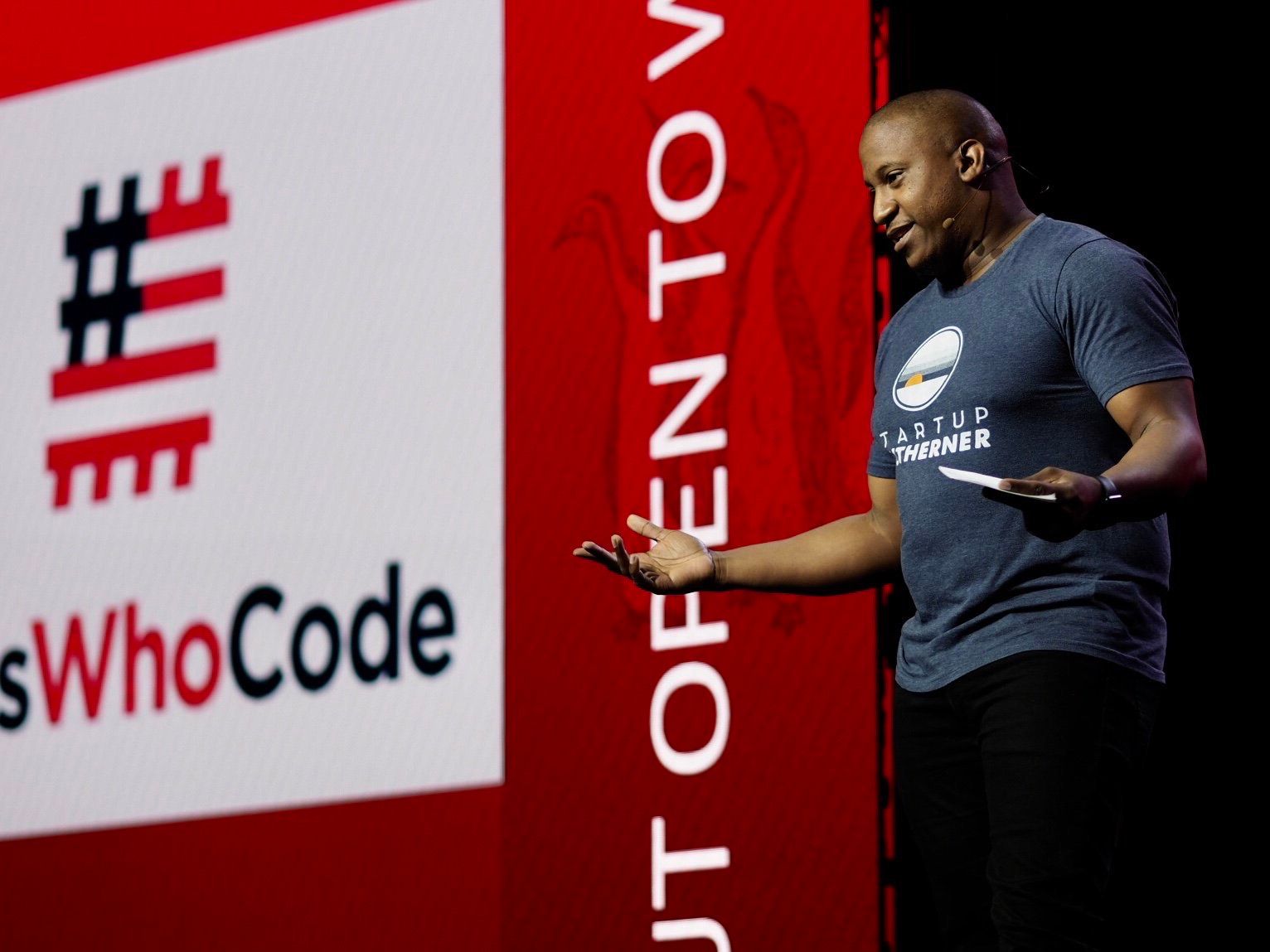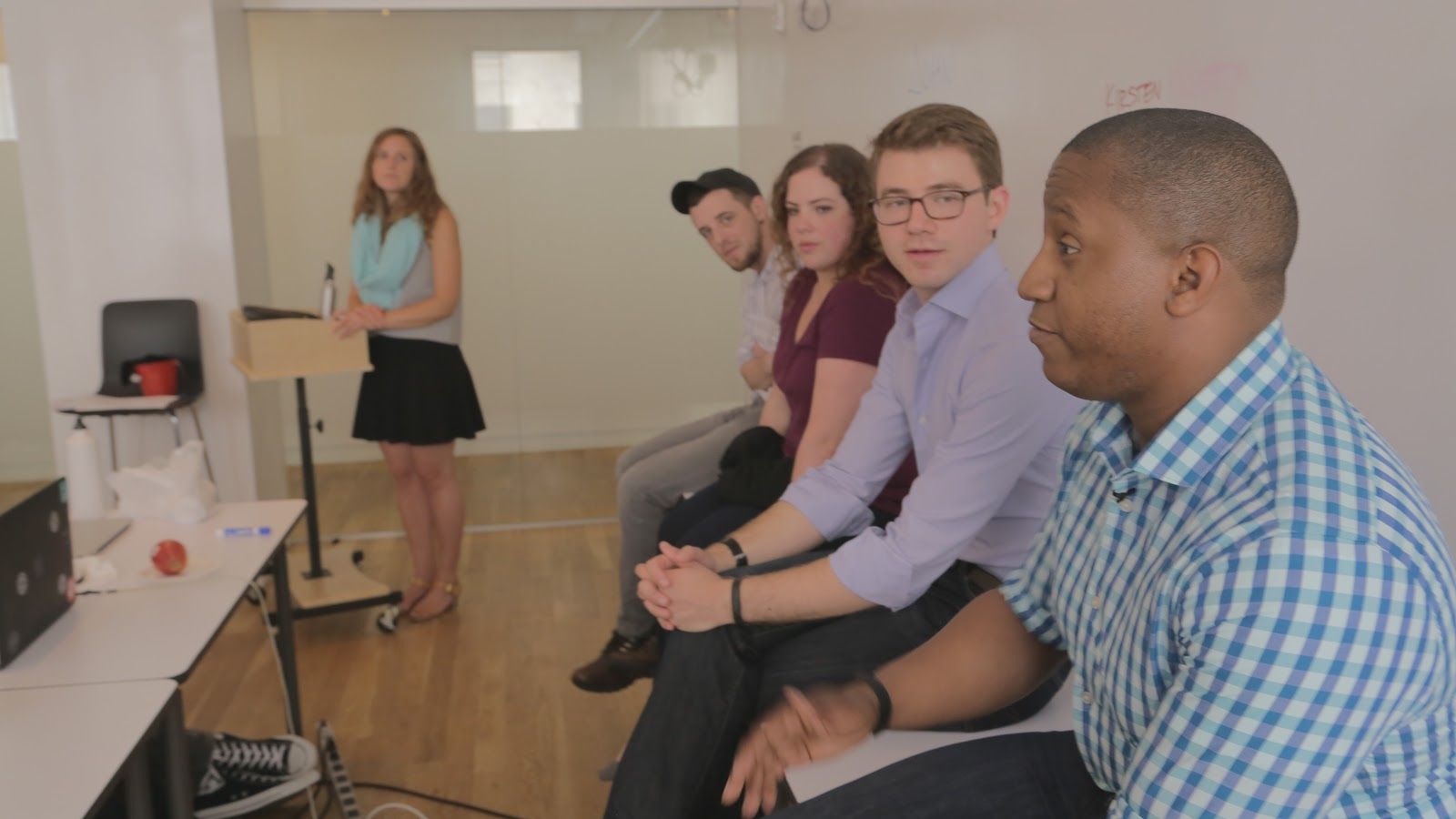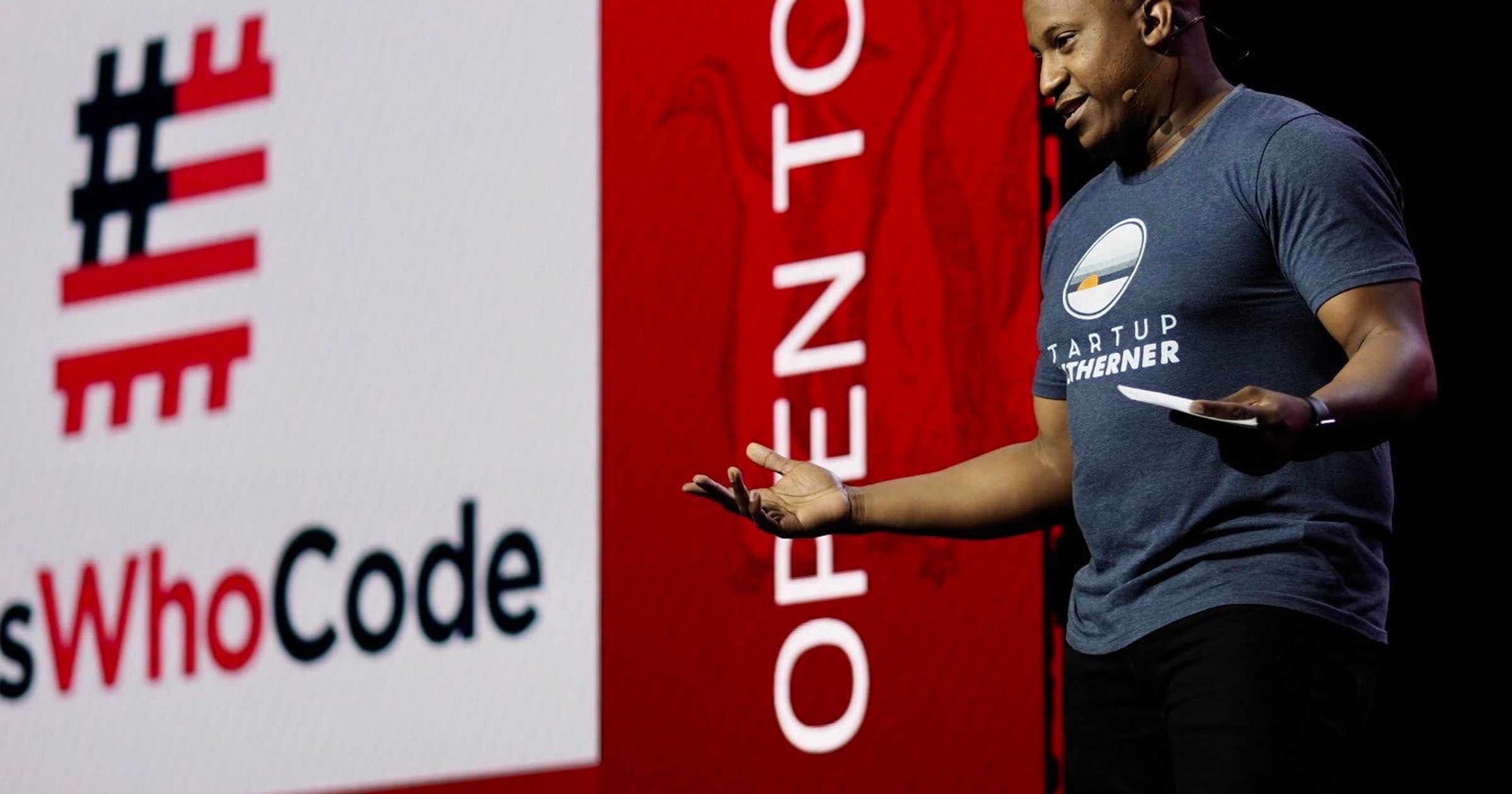For many, serving in the US military is both a duty and a path that leads them to something bigger. They learn how to work as a team, how to lead, and how to discipline themselves. But they don’t often get a chance to learn the programming skills that are in high demand in today’s economy. Because of that, their career paths can be limited.
Jerome Hardaway intends to change that. After serving in the United States Air Force, Security Forces, he found himself with a set of skills that didn’t transfer cleanly to the civilian sector. “My options were go back overseas as a private military contractor or stay stateside and hope they started hiring EST (Engagement Skills Trainer) specialists or SWAT team specialists,” he said. “But it was the middle of the recession. They weren't hiring people like that.” So he learned to code instead. And he wants more veterans to follow his lead.
In 2014, Hardaway started Vets Who Code, a nonprofit organization dedicated to teaching US military veterans how to code within the JavaScript ecosystem: HTML, CSS, JavaScript, Git, CLI, node.js, webpack, React, Gatsby, and GraphQL. To date, 250 veterans have graduated from the program. This cohort has gone on to find jobs in the industry across 37 states in the US. It’s 100% free to the veterans admitted into the program, 100% remote run, and 100% supported by donations. Hardaway heads up the organization while holding down a full-time JavaScript engineering role at CBS Interactive, where he builds websites for comic books and pop culture.

We spoke to Hardaway about how he got started writing code, what it was like visiting the White House on Barack Obama’s birthday, and where he sees his organization going in the future.
From the USAF to the IDE
If you’re wondering if Hardaway got a taste for computers from his time in the Air Force, the answer is absolutely not. “My job didn't even require computers beyond signing up for leave or trainings—the usual death by PowerPoint type stuff—until my last year when I ended up becoming a BDOC/security controller,” he said. “But even then it was pretty much plug and play.” When he got out, he started learning some SQL—he got a book on it and practiced, practiced, practiced. That landed him a job at the Department of Homeland Security as a database analyst.
But it was his next job that got him into web development. It was in digital marketing, but he wasn’t even supposed to touch the website. “When you're the youngest person on team, what usually happens is, ‘Hey, our website looks crap, fix it,’” he said. “I spent my first three months as the digital marketing specialist working on just the website.” Suddenly, he found himself programming, learning skills that took him deeper into the workings of the web.
While trying to sort out his next career move, he met the family of a fallen veteran who didn’t have the money to pay for a funeral. Local nonprofits and the VA weren’t providing the support this family needed, so Hardaway used his experience to build them a website, start a digital campaign, and help raise the funds. The campaign hit $10,000 in 27 hours. “I was like, ‘Okay. I did my good deed forever. I'm never going to hell. Peace out, y'all.’" He jokes self-deprecatingly about it now, but this was the genesis of Vets Who Code.
General Assembly saw his work for this veteran’s family and invited him to a 12 week bootcamp. “Most of the stuff, the first four weeks there, I already knew,” said Hardaway. Six weeks in he signed an offer letter as a Rails developer. “I think the most I learned out of my bootcamp was git,” he said. “If you want to become a developer today, you need to have started learning git and command line yesterday. Those are two skills that I think people don't give enough respect to.”
At this point, Hardaway had gone from veteran to professional developer only using his own wits and a bit of luck. He saw how his options were limited and looked for ways to broaden his opportunities. But he also realized that his fellow veterans might be in the same position. “I was like, ‘Why don't we teach veterans how to code?’ I'll never forget the first time I said that to a room of over 60 people. They were like, ‘No. Enlisted veterans couldn't code.’ The stigma was that enlisted veterans were followers and unable to critical think by those who didn't serve. Mind you, I'm an enlisted veteran that codes. I'm like, ‘Wait. Y'all are saying I can't do what I'm doing?’ To prove them wrong, I just pushed forward and started teaching veterans, and it's been a big success.”
So much so that in the first year he started Vets Who Code, Hardaway was invited to the White House for their first ever Demo Day. “It's the White House on Barack Obama's birthday, I’m shaking his hand,” he marveled. “I'm like, ‘Yo, this is crazy.’ My mama’s like, ‘Look what I did.’”

Skill up, solider!
For most of Vets Who Code’s five-year lifespan, Hardaway has taught every group of students. This is in addition to the full-time jobs he’s held during that time. He brings the lessons he’s learned in those jobs to his teaching. He started getting into the tangled world of front-end frameworks with AngularJS 1x on Rails. “It was essentially a dumpster fire,” he said. “This is back in the days where people were trying to use CoffeeScript on all the things. I don't know if you remember when CoffeeScript was a nightmare. I do, vividly. It's sadness.”
But he wasn’t put off of frameworks after that. Hardaway discovered React at a hackathon—which he won, BTW—and liked what he saw. He eventually became skilled enough to make a good living as just a front-end engineer. That’s why he focuses his classes on front-end skills. “You could find something you like, deep dive into it, and make a good living off of that,” he said. “You can be better than everybody at one thing and be fine. No one goes out there and tells the sniper that he has to be good at close quarters combat.”
His overall teaching philosophy comes from the military. Adapting concepts and processes that veterans are already familiar with made sense. For overall skill development, he favors an incremental approach. “When we prep for deployment, we call it crawl, walk, run. You start a little slower, with fundamentals. Then you just build upon that.”
He teaches these skills through meaty project-based work: products over projects he calls it. By doing it this way, a graduate will have better examples to share with a prospective employer and learn what it takes to build a real application. “A programmer that understands you've got to make the decision on what's going to help impact a business is worth ten programmers that can do fancy algorithms.”
Vets Who Code adopted a familiar squad format for all classes—no more than 13 students per class. In each of these classes, he separates projects into smaller discrete tasks. “I realize they're comfortable with having a squad leader and fire team leaders,” he said. “Splitting up things into small tasks—you'd be amazed how much Kanban and how much separation there is already baked into the military. They just call it working in fire teams. We're calling it Kanban.”
That focus on teams and collaboration makes his system one of constant assistance, but also of pushing each other to do better. Hardaway asks his vets to help their fellow students who are in similar positions. But he also makes sure to minimize the excuses that his students give, not to dismiss their concerns, but to motivate them to continue. “You can't have an excuse because this dude over here, he went through it while his parents were having triple heart bypass surgery. He was in another country at the time. Or this person here, he did it while in Iraq. If he could do it in Iraq, or he can do it while his parents are under the knife, then you can do it.”
But some veterans have some adjusting in order to get accustomed to the asynchronous communication and individual agency inherent in today’s development environment. A veteran’s ease with squads and division of labor can also mean they have some difficulty moving outside of their command structures. Hardaway talked about what his new coders go through. “First cohort, they always try to ask me, ‘permission to talk to this person?’ I'm like, ‘You don't have to ask my permission. You're free. You're like Dobby. You got your towel.’ But once they realize that they don’t need permission to control their careers, they become superheroes.”

It’s become a tight-knit community thanks to Hardaway’s teaching philosophy, and that community doesn’t disappear once someone finishes a class. Grads remain active in a shared chat room and continue to receive and give support. He wants Vets Who Code to “be a support system from reentry to retirement.”
VWC has an active mentorship program getting vets ready to move into whatever their next role may be. “We had a veteran who his first job was a QA engineer role in a big software company,” Hardaway said. “He wanted to move into dev ops. He came back to us to help with training in his interview. The mentor team, they got with him, and they kept training. He's been in his new role for about a month now. As long as you're engaging us, we're engaging you.”
While the classes and mentoring operate remotely, VWC’s support has spilled out into the real world. They have an IRL fund that reduces the friction between a veteran and their job search. “We had a veteran who was moving from Utah to Texas for his first job in tech,” said Hardaway. “The U-Haul he had broke down. I sent him money from our IRL fund to pay for that U-Haul, pay for a hotel room, get gas, all that stuff. We've had a veteran who was flying from New York to San Francisco. Paid for the plane ticket. He was flying for an interview. I do not want money to be the thing that gets in between you and getting a job."
Keeping vets on their game
When Vets Who Code first started, Hardaway was doing everything. Now he has an all-volunteer education team that teaches the curriculum in blocks—this will be the first year that Hardaway isn’t teaching the whole course. They have a CodePen team that creates CodePens (where Cassady Williams, who helps with our newsletter, used to work), which turned out to be a huge outreach tool. So much so that Chris Coyier, the co-founder of CodePen, came to speak to Vets Who Code on Veterans Day.
“The least you can do is help your fellow veteran,” Hardaway says. “And that helps us, because everybody on the education track was a veteran who came through and got a job because of that Vets Who Code. They’re joining the mentorship team. That's how we make them pay it forward. Now I have a little more breathing room because a lot of our alumni have taken over.”
That’s great, because as the software and engineering space changes, so do the needs of the VWC students. In their chatroom, the education channel is always the most active. Previous students see the material that current learners receive and get a little jealous. “I have cohorts, they come back a year later and are like, ‘Yo, can I slide into what those other cohorts doing? We weren't learning GraphQL. We weren't learning Grid and FlexBox. We were learning Bootstrap.’ Yeah. That was two years ago.”
Keeping up with all this requires more resources. VCW funds everything, from the education team to the cost of licensing software, through donations from individuals and partnerships. Through a partnership with Frontend Masters, every veteran coming through gets an account with them for a year. He just started a merchandise shop to sell VWC hash flag branded materials because people had been bugging him for three years about where to get them. “We're always looking for people, and especially resources,” said Hardaway. “We're looking for more resources on server side stuff. We're using a lot of Google cloud stuff now, and Netlify as well.”
For the future, Hardaway is trying to build more personalized tools and training to support individual veteran growth. He’s working on a tracker that will manage this, tracking growth and weaknesses so that mentors can put together more solid action plans to assist any students who are at risk of falling behind.
All that is in service of Hardaway’s ultimate goal of start to finish support. “That's my moon shot goal, to be from reentry to retirement. I want veterans to come to us, they get their first job in tech with us, and we're supporting them until they become managers. Or when they're like, ‘Oh, I might need to go back to school. I want to be a VP. I want to start my own business.’ And then, ‘Yo, man. I'm out of the game.’
